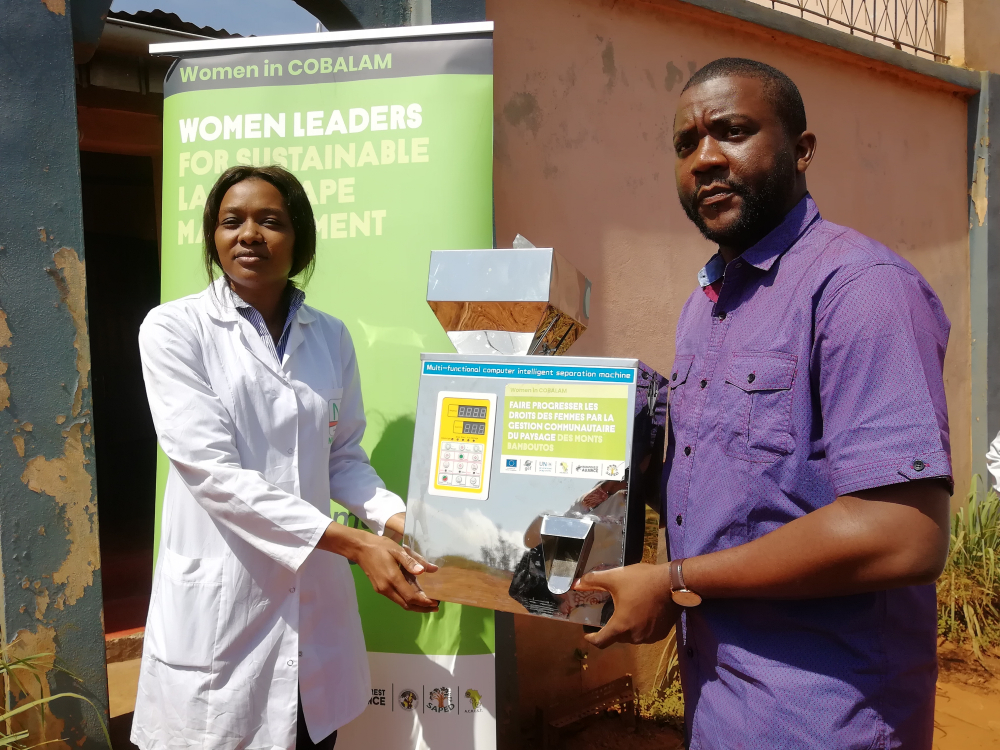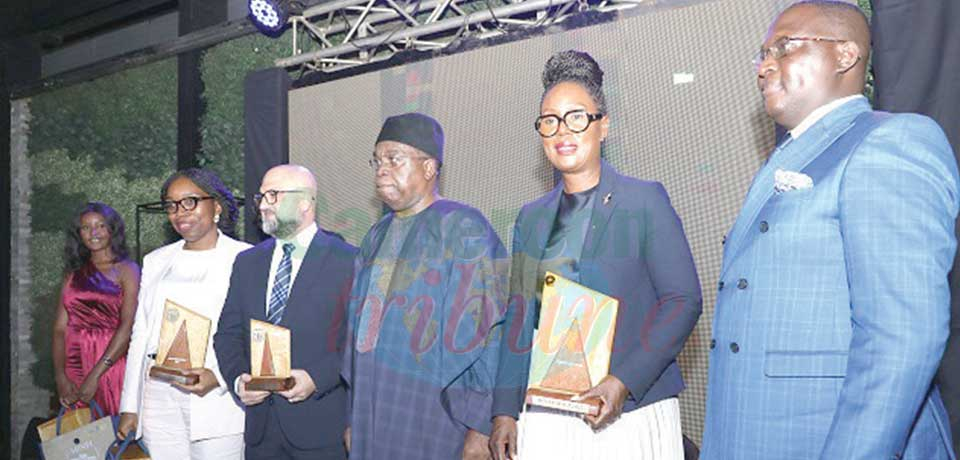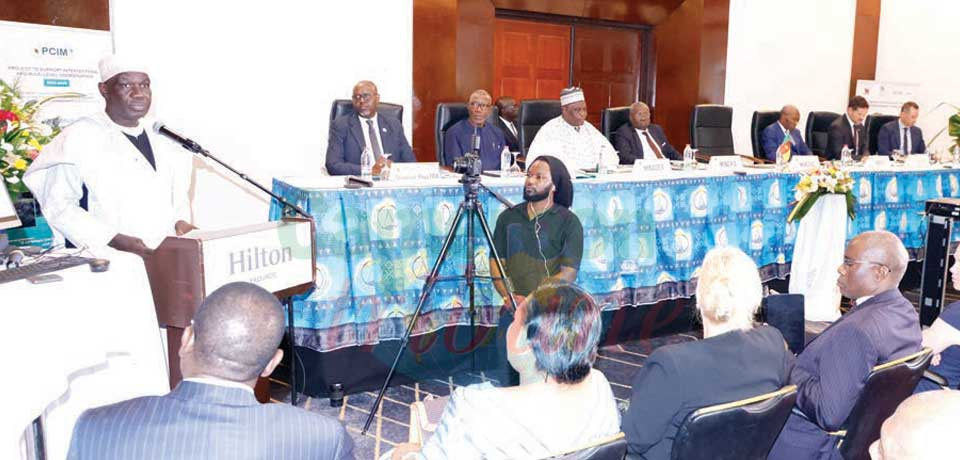Bamboutos Mountain Range Project : Assuring Stronger Women, Communities, Landscapes
- Par Kimeng Hilton
- 23 Mar 2023 07:48
- 0 Likes

Rainforest Alliance and partner from March 20-21, 2023 handed over equipment and tools to strengthen the livelihoods of 10 Community-based Organisations on the landscape that straddles the West, South West and North West Regions..
The Women in Community-led Landscape Management, COBALAM project on the Bamboutos Mountain Range runs from June 2020-June 2023. The landscape cuts across the Mifi, Bamboutos and Menoua Divisions of West Region, portions of Lebialem Division of South West Region, and Mezam Division in the North West Region.
Landscape Of International Repute
As a biodiversity landscape of international repute, the charity, Rainforest Alliance Cameroon, and its partners - Services d’appui à la protection de l’environnement et au développemen, SAPED. And ACREST - in June 2020 initiated the Women in COBALAM project. To help raise the standards of living of those who depend on the mountain range for their livelihoods. Especially the women. The project is funded at the cost of 660,512 Euros (about 433,267,470 FCFA) or 74 per cent by the European Union. While the remaining 26 per cent funding or 232,072 Euros (about 152,229,250 FCFA) is assured by COBALAM.
Joy, Smiles On Their Faces
It was all smiles on the faces of members of 10 Community-based Organisations (Common Initiative Groups and Very Little and Medium-size Enterprises). As Rainforest Alliance and SAPED officials crisscrossed various communities in Mifi and Bamboutos Divisions to “officially hand over” various tools and pieces of equipment donated by Women in COBALAM. The objective was to raise the voice and incomes of the mostly female project beneficiaries.
Promoting Employment, Curbing Post-harvest Loss
“The equipment will help us to boost productivity, recruit young people and reduce post-harvest loss,” commented Mrs. Penkam Ngeubou Jorelle, leader of Niama B group located in Ngouache neighbourhood of Bafoussam. Niama B (or “Eat well”) processes Irish potato and other tubers into flour for pap and pastry production.
Better Packaging, Protection Against Bees
“We are more at ease now with our bee farming activities. Before the offer of equipment by Rainforest, we faced so many difficulties. For example, during harvesting, we could not protect ourselves against bee bites. Now, there is no such worry as we received honey harvesting gear from Rainforest Alliance through SAPED. Our honey packaging will now be more attractive. We are so grateful!” said an elated Meogopa Robert, leader of the APEB bee farming group in Babadjou, Bamboutos Division.
“Grinding Distance” Reduced
“Before the gift of the grinding mill on December 23, 2022, community people had to trek as far as 3 km to grind maize and cassava. We are so proud of the project! The grinding mill has facilitated life for us all!” Mrs. Manto Brigitte reacted. Her Afa’Apon Common Initiative Group today boasts a grinding that serves 200 community people from 50 homesteads in Balepo, Babadjou, Bamboutos Division.
Passing On Gifts, Training
In Balatchi village, located 14 km from Mbouda, headquarters of Bamboutos Division, the joy of members of GIC Ndasse group knows no bounds. The group, which carries out bee farming, received equipment from Rainforest. As well as a grinding mill.
“The entire community is happy because they no longer have to cover 5 km to grind their maize and cassava. Other bee farmers in the village are making use of the equipment Rainforest Alliance offered us. I freely lend my honey harvesting gear to them so that they will not be bitten by bees. We are making good use of the training we received, like producing environmentally-friendly manure. For which I have been training other community members. All this will reduce poverty in our community,” GIC Ndasse leader, Tangmouou Etienne, explained with a grin.
Improved Cooking Methods
Further up the Bamboutos mountain range in Batomeni village, Balatchi, Mrs. Dzeutouo Dorantine, Secretary of GIC AGREMOBAT, could not contain her joy. Agriculture et elevage moderne de Batomeni, AGREMOBAT, Common Initiative Group comprises 12 members, with 7 women. Members received training on crop processing, ecological charcoal production and also got a grinding mill. “From ACREST, we got improved firesides that use ecologically-friendly charcoal. We also got water filters to help us guard against water-borne diseases. While the improved firesides will help to economise firewood and reduce pressure on deforestation on the landscape,” said Dorantine.
Precious Pear Oil!
In Batcham Subdivision of Bamboutos Division, GIC Tstesa’Bong (“Soil is good”) located in Balena community, has a similar story to tell. The group received equipment, including a dryer, press and crusher for extracting pear oil. According to Sahagoum Claude Marlot, leader GIC Tstesa’Bong, pear oil is used in treating a number of skin and health challenges – including hair loss and cancers.
“We were trained in agribusiness (how to manage little businesses) and process pear oil... Our members worked hard, taking part in all training sessions. We look forward to being trained on how to use the donated equipment. After which we will be ready to hit the road with our pear oil production by increasing production and productivity,” Sahagoum pledged.
The Days Of “Suffering” Are Over!
In Batcham town, GIC Lehiebong (“Wisdom is good”) members burst into spontaneous singing and dancing to conclude the official handover of pear oil extraction equipment by Rainforest Alliance and SAPED officials. The song said: “The days of suffering and toiling to extract very little quantity of pear oil from much pear are over! Now, our new equipment from Rainforest Alliance is there to ease our work! We will produce more pear oil, make better money and lead better lives!” the song rang out.
According to Mrs. Fouomene Anne, Lehiebong leader, they started from nothing, but grew in knowledge and skills within a short time! "We are grateful to SAPED and Rainforest for the assistance. Certainly, there will be greater project impact on our families, group and standards of living,” Mrs. Fouomene predicted.
“Before now, we could only extract a few mili-litres of pear oil from a 15-kg bucket of pear. With the new equipment, we hope to produce at least a litre and half or two litres of pear oil from a 15-litre bucket of pear,” Anne said assuredly. According to Gervais Sibolewa of SAPED, the new equipment will enable the group to increase pear oil production by at least 400 per cent!
Irish Potato, Carrot, Pear As Key Crops
“Women in COBALAM project retained Irish potato, carrot and pear oil as the main products on the Bamboutos mountain range. They no longer suffer much post-harvest loss. ...
Cet article complet est réservé aux abonnés
Déjà abonné ? Identifiez-vous >
Accédez en illimité à Cameroon Tribune Digital à partir de 26250 FCFA
Je M'abonne1 minute suffit pour vous abonner à Cameroon Tribune Digital !
- Votre numéro spécial cameroon-tribune en version numérique
- Des encarts
- Des appels d'offres exclusives
- D'avant-première (accès 24h avant la publication)
- Des éditions consultables sur tous supports (smartphone, tablettes, PC)














Commentaires